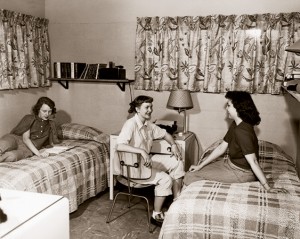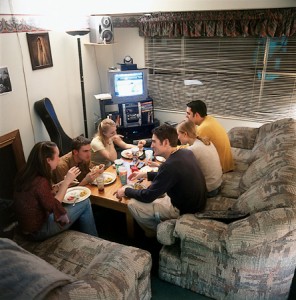Readers remember the adventures, battles, and friendships they experienced with college roommates.
The Importance of Fudgies
CindiLee Turpin-Thomas, ’80, Den Haag, The Netherlands

Inhabiting the same space for a semester or more, college roommates often learn as much about interpersonal communication, economics, and group dynamics at home as they do in class.
I had many wonderful and interesting roommates in my four years at BYU, but the one who comes most readily to mind—probably because of the effect she had on the way I look at things and even on some of the phrases I use—was Laurie Deardon (now Deardon-Couch), ’85.
Laurie was from Minnesoooota (that’s the way she always said it, and the way I say it to this day) and had the most rosy outlook on life. I seldom saw her without a huge smile, and an infectious, musical laugh was always close at hand. She also had a knack for interesting sayings. When wanting to inquire if someone is ready to go or move on with something, I still find myself asking, “Soooo, howya doin’ on yer pop, there?”
But the Laurie story that makes me smile the most was the day I’d gone to Carson’s Market (now the Creamery on Ninth) and picked up a bag of Kraft Fudgies. Laurie came in from class, saw the Fudgies on my desk, and said, “Those fer us?” When I nodded affirmatively, she lit up, exclaiming, “Oh, Fudgies are what life is all about!”
I laughed so hard that I nearly fell out of my chair. And I saved all my silver Fudgie wrappers from that bag so that, when it was empty, I could cut block letters from them and present Laurie with a poster exclaiming, “FUDGIES ARE WHAT LIFE IS ALL ABOUT!” It was such a perfect expression of her joy in simple things.
I’m told that the poster went to France with Laurie on her mission. I wonder what the French made of that.
The Adventures of Nila and Paralee
Nila Morrow Blackham, ’84, Orem, Utah
I was a little nervous about what kind of roommate I would end up with my first semester at BYU, but I was too psyched about coming to college to worry much about it.
As it turned out, worry was needless. The Helaman Halls housing office used advanced methods of matching to pair me with the perfect roommate. They took the two weirdest names on the list (Nila and Paralee) and put them together in the same dorm room. (Our R.A. actually confessed that this is what they had done.) With that much in common, Paralee and I went to work to become friends.
We soon found that we had one big thing in common. Both of us felt the vague, wistful desire deep inside to cut loose and be kids while there was still time. The upperclassmen didn’t take us seriously, anyway. They seemed to expect freshmen to act like children. Now was our chance!
One of our first freshman adventures involved the girls across the hall, Cindy and Carol. Carol was “older”—probably 19—and consequently was dating returned missionaries. She had set up her young and sporty roommate, Cindy, on a blind date with her RM boyfriend’s roommate. Carol was a little bit condescending about this, acting as though she were bestowing queenly favors upon a pauper. Cindy was too good-natured to mind, but it really irked Paralee and me. We saw it as a judgment against “immature” freshmen. So we set out to prove the judgment correct!
The boys were to meet the girls in the dorm lobby at 6; Carol was planning to be a little late and make a grand, theatrical entrance with Cindy. Paralee and I beat them to the punch. We were there waiting at 6, when the two unsuspecting boys arrived. We had curlers in our hair, cold cream on our faces, and were wearing our fuzzy bathrobes and slippers. As a crowning touch, we had each blacked out one of our front teeth. We knew the boys’ names because Carol had been talking about them incessantly for days, so we called them by name as we rushed forward to greet them. I pretended to be Carol, and loudly and elaborately introduced “Cindy” to both of them. We went on and on about how excited we were to be going out with them, stalling until the real duo arrived. They did, about five minutes later, and the look on Carol’s face was worth money in the bank. She didn’t speak to us for days after that, which was an added bonus.
Just before Christmas vacation that year, Paralee and I decided to go Christmas caroling at the president’s house, which at that time was right on the west edge of campus. Dallin H. Oaks was president at that time. I’m sure it’s no coincidence that BYU presidents no longer live in that house—we weren’t very musical.

In sharing social experiences, the strains of college life, and compact living quarters, roommates often forge friendships that extend far beyond their college years.
The next spring, following another irritation with the superior Carol, Paralee and I made a huge poster and hung it in the Cannon Center, which we had dubbed the “Cancer Center.” It said, “Help! We need to lose weight! Please call Carol and Cindy with suggestions,” and listed their phone number at the bottom. The payoff came that evening as we were sitting in their dorm room across the hall. The phone rang, and Carol answered it. “Yes, this is Carol.” A long pause. “Thank you.” She hung up, looking puzzled. “Who was it?” we asked. “Some guy talking about diet and exercise,” she answered. The phone rang again. “Yes, this is Carol . . . Don’t walk past the bakery? What are you talking about?” She looked at the phone incredulously as she hung it up. By this time Paralee and I were busting up, and we had to admit what we’d done. There were several more phone calls that evening, and watching Carol field them was a delight. She and Cindy retaliated, of course, by making their own poster that said, “Nila and Paralee need a date. Please call . . .” This backfired on them, however, as several guys did call, and we went on some fun dates as a result.
Through all this the girls on our dorm floor became like family. There was a little girl named Naomi who liked to put on her senior cap and gown and play “Pomp and Circumstance” on her boom box while she walked solemnly up and down the hall. There was Liz, who was there on a basketball scholarship, and Lorraine, who played soccer and could carry on an intelligent conversation (but not at the same time). There was Carolyn the flag twirler and Lana the flower girl, Cheryl the southern belle and Cheryl the model. We all had our obsessions and our quirks, but everybody accepted everyone else in spite of these things. It was a wonderful experience.
The Grand Concert of Nature
Stephanie Huang Porter, ’98, San Jose, Calif.
I’d always been afraid of thunderstorms. Living in the women’s Chinese house at the Foreign Language Student Residence, away from my family in California, made the perceived danger of lightning and power of thunder loom large and terrifying to me.
However, one night changed my view of thunderstorms. I lived with some of the best roommates of my BYU education. I was 19, and they were all returned missionaries. All were intelligent, beautiful, and accomplished women. I looked up to them and learned so much from our friendship.
That evening as the first loud crack of thunder rolled over our little corner of the world and the lightning threw up shadows in our dark apartment, my roommates pulled open the blinds and turned up Celine Dion’s The French Album on the CD player. With my roommates and the music, my fear suddenly was overcome by the splendor I had been too frightened to notice. I don’t look at thunderstorms the same anymore; they don’t make me cower. I love their majesty and ferocity, almost like a grand concert of nature. But most importantly, they remind me of my roommates—my friends.
The Cold War of Trash
Jason K. Smith, ’95, American Fork, Utah
As one of six male roommates in a Glenwood Apartment during winter semester 1993, I always dreaded cleaning—a duty that rested uneasily on our shoulders. We’d usually mobilize the morning of cleaning check because that was easier than failing and having to clean again a few days later, but otherwise we tended to ignore the mess that accumulated throughout our apartment.
Our discussions on the topic tended toward such meaningful exchanges of ideas as: “You going to take out the trash?” Silence. “Well, I’m not taking it out.” It was probably inevitable that our troubled peace would break and turn into a full-fledged cold war of trash.
Looking back, it is easy to pinpoint the exact moment our peace turned to war. Some roommate, noticing the full trash can in the corner of the kitchen, decided to deposit his container of gnawed sparerib bones on the floor, leaning against the trash. Other roommates, understandably, thought that picking up someone else’s ribs was above and beyond the call of roommate duty and also deposited their trash beside the filled trash can.
With each vowing in his heart that he wasn’t going to take the trash out, the trash can soon became the trash corner. Every evening when we would come home from campus, our first furtive look was to see whether someone else had taken out the trash. Upon noticing that no one had weakened, we all would renew our silent vow not to be the first person to sell out our principles merely for the notion of cleanliness.
Remember the Shel Silverstein poem “Sarah Cynthia Sylvia Stout Would Not Take the Garbage Out”? Well, that poem became reality in our apartment. Our trash corner soon became our trash area, which became our trash entryway. The rib bones were joined by pizza boxes, greasy paper towels, J. Crew catalogs, ice cream containers, striped BYU Bookstore bags, and other, unmentionable items of refuse.
So, how did the war end? I don’t know, because I wasn’t the first to weaken. All I know is that one afternoon about three weeks after the start of the hostilities I saw one of my roommates on campus who greeted me by saying, “The trash is gone.”
I received this news with bittersweet melancholy. It was one of those moments that you know—as it is happening—is the end of an era. I still don’t know the details of how the Cold War of Trash ended. However, my thought is that one of my weaker roommates saw the cleaning check doomsday fast approaching . . . and cracked.
I am glad that roommate has remained anonymous all these years—some shames are best kept buried. But I thank all my roommates for that indelible lesson in group dynamics.
Family Bonding
Glenda Nelson Belnap, ’75, Idaho Falls, Idaho
Perhaps the ratio of female to male students has changed since the early ’70s (many of our boys were soldiers in Vietnam), but typical family home evening groups assigned through the BYU wards consisted of six women and four men. Ours was no different. The four returned missionaries assigned to the six of us in our Campus Plaza apartment were charming and handsome. They met with us every Monday evening and dropped by often to see if we needed them to take us grocery shopping or help us with homework. Initially, I just thought they were magnifying their priesthood responsibilities, but by Christmastime of that year, it was obvious that this pseudo-family organization was turning into something much more permanent. Three of our “brothers” had obvious romantic attachments to three of our “sisters.” Within the year, they were all married, and we made each wedding a family affair. Today, more than 25 years later, most of us keep in touch and still remain best friends.









